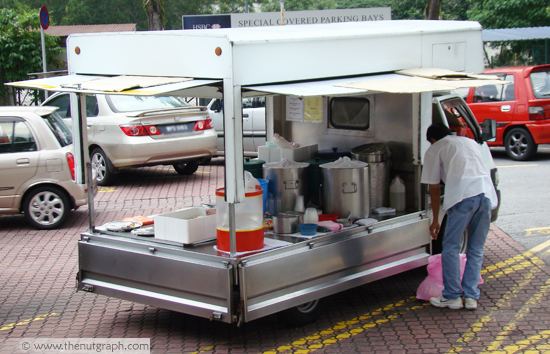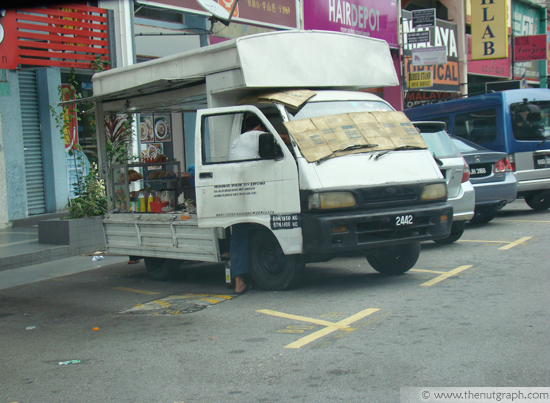STREET hawkers who ply their wares off mobile vans are a common sight these days around Petaling Jaya (PJ). During the Petaling Jaya City Council (MBPJ)’s April full board meeting, the issue was discussed in brief. The matter of how street hawkers were taking up valuable parking space was raised and reported in The Star on 28 Apr 2011.
Mobile vendors responded the very next day, protesting against the proposed RM400 monthly fee, saying it was exorbitant. The Star quoted several vendors proposing a lower fee of RM100 instead. A local MCA politician also came to the hawkers’ defence.
As with many issues facing MBPJ, the reality is less than straightforward. On one hand, it could look like MBPJ is guilty of villainous oppression against poor traders. But what are MBPJ’s considerations in this matter?

Original mobile vendors
The licences for these street hawkers are referred to as mobile vendor licences, and technically require these vendors to continuously move about. Traditionally, there were only four business categories that fell under this sort of licensing: the roti [seller], the ice-cream vendor, the milk vendor and the vegetable van vendor, all of whom are a rarity these days.
The nature of business for these original mobile traders was such that they had to remain constantly moving to ply their wares. This is one of the reasons why their licences contained a clause stating that traders must be on the move and can only stop their vehicle when they conduct a business transaction.
The concept was at first a novelty, but a new generation of mobile traders has caused a slew of problems for the authorities and the surrounding areas.
Problems galore
Today, mobile vendors are not as mobile as they used to be. Traders now often look for a convenient spot to park their vehicles to conduct business, usually in areas with heavy traffic to attract customers.
Customers crowding around these mobile vendors can cause traffic congestion. Even more problematic is the fact that customers often litter the place. As there is no proper waste disposal prepared, wrappers and bamboo skewers can sometimes be found littered all over the ground where these mobile vendors trade.
Some mobile vendors who trade in popular public parks where there is ample space even set up tables and chairs, turning the area into a mini-restaurant of sorts. Water for washing utensils is at times obtained from nearby public toilets. This poses a hygiene problem as well as possible damage to the road pavement over time when the water runs freely on the ground.
Vendors operating near shops and who take up valuable parking spots also face complaints from shoplot owners who pay much higher overheads and potentially lose customers who could otherwise have parked in the spot. Shoplot owners could also argue that as ratepayers, they deserve priority over mobile vendors.

Mitigating the problem
The relatively cheap licences and low cost of obtaining a van for business makes the mobile business model more attractive to many traders than opening a restaurant. However, new licences have not been given out for many years due to the many issues associated with mobile vendors. Many mobile traders, however, simply do not bother applying for licences, operating at night to avoid enforcement action.
Existing hawkers who have mobile vendor licences are allowed to renew them. The council cannot simply deny licences to existing holders and deprive these persons of their livelihoods. A middle ground has to be reached.
The RM400 monthly fee was one such initiative where the trader would have to pay parking fees similar to any other person or business occupying a parking lot. This, however, is still not an ideal solution, nor is it entirely legal, since a mobile vendor that cooks and sells food could also potentially be violating hygiene-related laws.
Political expediency?
Regardless of its limited application only on traders who occupy parking lots, an increase in fees could be seen as unfair and unjust. This is an ideal situation for politicians to promise to protest against such “unfair” policies and come out looking like heroes.
I suspect that due to this outcry, the council may back down and leave the matter alone for the sake of political expediency. In the past, the three-strike rule against dirty restaurants and the proposal to enforce the law against illegal barricades were ultimately stopped by similar unhappy sentiments.
How is a responsible council to balance enforcing the laws it proposes and responding to the public it is meant to serve? It is acknowledged that the council needs to be open to feedback from members of the public. But what if public feedback indicates that members of society would prefer not to comply with the law?
Whatever it is, constantly reversing policy could be interpreted as a sign of a weak government, one capable of being held to ransom by an angry public. And one thing is certain: the patchwork of remedies we have come up with is slowly eroding the public’s respect for the law. ![]()
MBPJ councillor KW Mak notes that people complain about the law not being applied, then complain about the law being applied. There is simply no pleasing the public.


Shawn Tan says
I think that this is a simple matter of following the law.
As your first paragraph indicated, the vendors are not against the principle of paying for the lot, but are largely concerned with the cost. Therefore, the problem is pricing.
Designate a number of parking lots as spots for these ‘stationary’ vendors, and only at certain designated hours e.g. non-peak hours. Then, MBPJ can offer it for RM100 as it is time and space limited.
The hygiene issue is another problem.
KW Mak says
@ Shawn Tan
Who is to say that if the council reduces the quantum that the demand wouldn’t be made for a lower sum or for no fee at all? Would you stand by your statement of implementing a lower fee if it gets challenged still?
I ask these questions to you simply because these were the challenges that the council faced when it attempted to implement some of the other policies that I mentioned at the end of the article.
For example, would you defend the right of the residents to put up barricades along residential roads, even if it is clearly stated in the law that it isn’t allowed?
Rather than focus on the aspect of quantum, I would like readers to note that there are numerous other considerations and factors at play when it comes to policy matters.
Regards.
Andrew I says
Maybe if salaries were commensurate with the escalating cost of living and people didn’t have to look for other ways to make ends meet, there’d be less hawking going on.
Maybe if there were less crime, there’d be fewer D.I.Y. barrack-style sentry posts.
A lot of maybes… that’s why I’m not a politician.
KW Mak says
@ Andrew I
Maybe if you were a politician, we wouldn’t have all these maybes? 🙂
Andrew I says
Thank you for the vote of confidence. You mean like Lee Kuan Yew? There are a few maybes popping up now even in no maybe Singapore.
I don’t know. Is there something called good fascism?
KW Mak says
@ Andrew I
You ask many questions that there are no answers to unless you make the answers yourself.
I chose to answer my own questions by accepting the councillor appointment. Did I find my answers? Not yet… but I did find many more questions to ask, some of which I am sharing with the readers of The Nut Graph.
When I find my answers, I will share those too… unless the answers are slapped with the Official Secrets Act, of course.
Andrew I says
Can’t argue with you there. You have my support e.g. via troll bashing…when TNG allows it. :-p
Patrick says
It appears to me that the work of a councillor is kind of like being in a daily Catch-22. Damned if you do, damned if you don’t.
Though it also seems that you have to sort of please everyone: the council, the street hawkers and the politicians.
Are there occasions where you’d just offend one to get the work done, or offend everyone anyway?
KW Mak says
@ Patrick
I think I offend people simply by trying to get things done. The revelations for the PJ Old Town land leases that I made back in October last year offended a few politicians. I had approached a few of them to discuss the matter internally. It was apparently too hot for the politicians to touch, as it would cost the Selangor govt too much in terms of revenue. So the politicians bounced me from one person to another for a year before I got fed up and published my findings independently.
Similarly, when I exposed the fact that several senior MBPJ officers owned low-cost flat units in January last year, it was only after I requested the mayor to investigate and he did not respond to my official letters. And even then, I wrote a warning letter to the mayor to tell him that I would expose this to the media and he had a week to respond to me still before it happened.
Are these issues resolved in any way? Nope.
The politicians do not interfere because they do not dare risk the ire and wrath of the civil service that command a sizeable chunk of the votes. As one Pakatan Rakyat supporter told me, it’s about 2 million voters the politicians risk offending, so everyone would want to be on the civil servants good books – or at the very least not be in their bad books.
Me, I’m not elected. I was appointed to do a job. That’s what I’ll do, even if it angers those who appointed me to do the job.
Patrick says
So the politicians don’t go in for the fear of offending the civil service. Hence, the civil service is free to do as it likes?
You’re not saying that we’re at their mercy now, are you? All because of votes?
KW Mak says
@ Patrick
The views I share are my own. It would not be wise to draw a conclusion based solely on one person’s comment alone.
Perhaps it is best you direct that sort of question to your ADUN / MP the next time you have a problem with the government and it takes forever to resolve the issue.
Regards